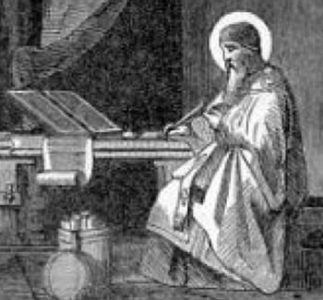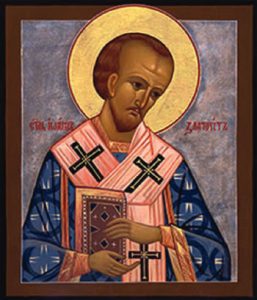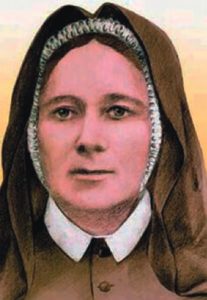September Saints
 Saint Eulogius of Alexandria
Saint Eulogius of Alexandria
(d. 607)
Eulogius was a Syrian by birth and, while young, he entered the monastery. The Eutychian heresy had thrown the Churches of Syria and Egypt into much confusion, and many monks failed in matters of morality and doctrine. Eulogius avoided such traps and excelled in his way of life and his orthodoxy.
He studied widely before setting himself to the study of the Scriptures, the tradition of the Church, and the approved writings the Fathers.
Despite his preference for solitude, Eulogius was ordained a priest of Antioch and in 583, was appointed Patriarch of Alexandria. About two years later, on a journey to Constantinople, he met Pope Saint Gregory the Great, and they became great friends. Among the letters of Saint Gregory, there are several which he wrote to Eulogius.
Eulogius wrote against several heresies, in particular defending the two natures (humanity and divinity) of Christ. Most of his writings have been lost, other than one sermon and a few fragments. He died in the year 607.
Saint Eulogius, help us to resist the many challenges to our Catholic faith.
(Source: http://catholicsaints.info)
 Saint John Chrysostom
Saint John Chrysostom
(344-407)
St. John, named Chrysostom (golden-mouthed) on account of his eloquence, was born about the year 344, in the city of Antioch. His mother, aged 20, was regarded as a model of virtue. He studied rhetoric under Libanius, a pagan, the most famous orator of the age.
In 374, he began to lead the life of an anchorite in the nearby mountains, but in 386 the poor state of his health forced him to return to Antioch, where he was ordained a priest.
In 398, he was elevated to the See of Constantinople and became one of the greatest lights of the Church. But he had enemies in high places and some were ecclesiastics. His most powerful enemy, however, was the empress Eudoxia, who was offended by his preaching which she believed was aimed at her. Several accusations were brought against him in a pseudo-council, and he was sent into exile.
Though the Pope remained his friend, and did for him what lay in his power, John’s enemies eventually banished him still further, to Pythius, at the very extremity of the Empire. He died on his way there on September 14, 407.
Saint John, teach us to stand firm in the faith in the face of opposition.
(Source: http://www.catholic.org)
 Blessed Eugenia Picco
Blessed Eugenia Picco
(1867-1921)
Blessed Eugenia Picco, born in Crescenzago, in the district of Milan, in 1867, was the daughter of a famous musician. Raised mainly by her grandparents, she saw her parents only irregularly between tours. Her father disappeared in mysterious circumstances, without explanation. Eugenia remained with her mother in an irreligious and corrupt environment. She recalled: “Dangers and occasions at home and outside.” In order to escape her homelife, she spent her free time at the Church of Saint Ambrose. One evening in May 1886 she felt called to become a saint and at the age of 20 in 1887 she decided to seek religious life.
She ran away to the Ursuline Sisters in Milan, and was professed in 1894. She became novice mistress, archivist, general secretary of the Congregation, member of the Council and, finally in 1911, Superior General, a post she held till her death. She showed excellent administration skills whilst also devoting herself to the poor. At Parma she lived as poorly as the people, responding to the needs of the young, needy families and assisting the victims of the First World War.
Her heart was always open to every cry, pain, and social or individual concern. The Eucharist was her main support and the source of all her work and apostolic activity.
A degenerative bone condition led to the amputation of her right leg in 1919. She offered her sufferings for the accomplishment of God’s plan, and remained a smiling friend of Christ, her Sisters and the world. She died on 7 September 1921.
Blessed Eugenia, obtain for us the grace to suffer illness patiently.
(Source: Internet – various)
 Entries(RSS)
Entries(RSS)